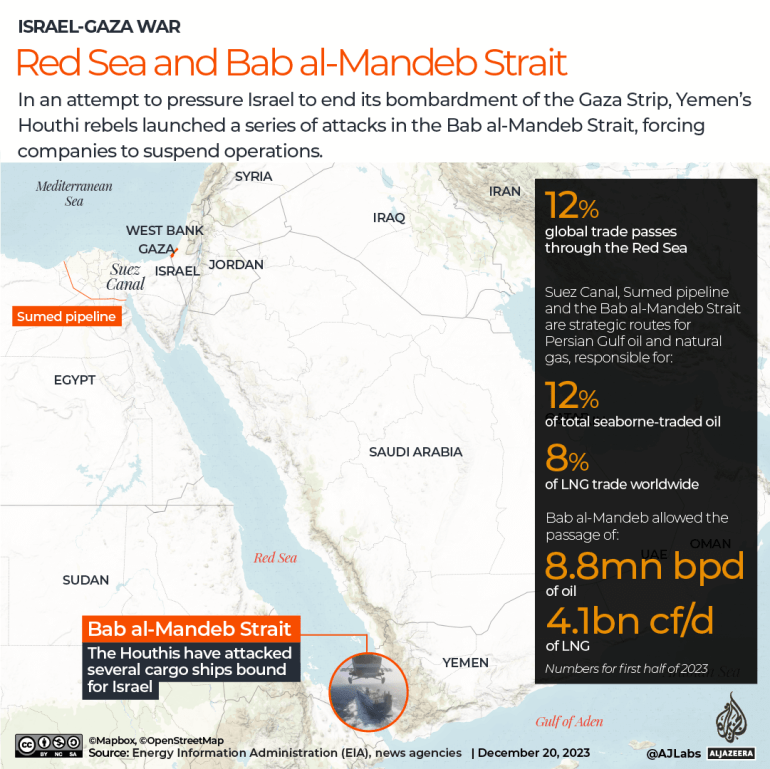Is the Houthi Red Sea attack hurting Israel and disrupting international trade? |

Some of the world’s biggest shipping companies have been forced to return their ships at high cost after Yemen’s Houthi group targeted ships entering Israeli ports in cooperation with the Palestinians.
An Iranian-aligned group has called on Israel to allow humanitarian aid into Gaza, which has been reeling from more than two months of Israeli siege and bombing. The Yemeni movement has also called on Israel to end its brutal war in Gaza that has killed more than 19,000 Palestinians.
The United States on Tuesday announced the creation of a 10-nation coalition to counter threats that threaten to disrupt trade through one of the world’s busiest waterways.
Let’s take a look at who the Houthis are, how they are disrupting international trade, and what they can hope to achieve from it.
Who are the Houthis?
The Houthis rebelled against Yemen’s internationally-recognized government in 2014, starting a conflict that has led to a civil war that has created a major humanitarian crisis in the impoverished Arab country.
For years, with the help of Iran, they fought a war against an army led by neighboring Saudi Arabia that included Western and regional organizations. However, the conflict in Yemen reached a critical point, when Saudi Arabia decided to start peace talks with the group after years of war.
Also known as Ansar Allah, it now controls most of Yemen, including the capital Sanaa and some areas in the west and north near Saudi Arabia.
He oversees a wide range of weapons, including drones and various missiles – including anti-ship missiles which for the first time were successfully used against ships in the Red Sea.
Earlier this year, Saudi Arabia agreed with Tehran, a close ally of the Houthis, to restore relations after seven years.
With Yemen’s negotiations and Iran’s cooperation still in place, the kingdom did not join the US-led coalition. Other wealthy Arabs such as the United Arab Emirates and Egypt did not join.
Who are they attacking?
The Houthis first fired missiles and drones into southern Israel in October, but they either missed their target – about 2,000km (1,240 miles) away – or were intercepted by Israel and its allies.
But as Tel Aviv continues to reject international requests to end the war, they have increased their tensions, based on their position near the Red Sea, especially near the narrow Bab al-Mandeb strait that connects the Gulf of Aden to the south of the sea. the sea.
They have seized and detained a merchant ship in their ports, attacked dozens of merchant ships carrying everything from cars to food, and the Pentagon says some of their projectiles travel directly to US warships before being fired upon.
The Houthis say ships that do not communicate with Israel are not a concern, and will only target Israeli ships or take goods to or from Israel. But tracking the ownership of the ships can be difficult, and some of the companies involved have denied any ties to Israel.
Are they seriously disrupting sales?
Bab al-Mandeb is where 12 percent of the world’s crude oil trade, as well as 8 percent of natural gas, will pass through in the first half of 2023, according to the US Energy Information Administration. That’s 8.8 million barrels per day of oil and 4.1 billion cubic feet per day of LNG.
More than 17,000 ships pass through it every year, some of them go to the Suez River which takes them to the Mediterranean Sea and acts as a link between Asia and the West.
Denmark’s AP Moller-Maersk, which accounts for 15 percent of the global shipping market, has been among the world’s biggest names in the shipping industry to decide to abandon the route. Together with Germany’s Hapag-Lloyd, which has also exited, they account for almost a quarter of the market.
Container rates for shipments from North Asia to the United Kingdom, which go through the Red Sea and the Suez Canal, have risen sharply this year, according to S&P Global Platts analysis. Underwriters are paying large sums of money to insure ships planning to take the route.
Some shipping companies are choosing the only other sea route – to take the long route around Africa. But this can mean more money, and can add up to two weeks to their journey.
The shipping industry’s woes come amid yet another unfortunate event for them as the Panama Canal has once again experienced a significant reduction in the amount of traffic it can handle due to the drought.
Who will be most affected?
Israel, which was the primary target of the Houthis, has already been affected by the disruption of maritime trade.
Traffic through its southern port of Eilat, which is in the city’s main tourist hub, has ground to a halt, and the future looks uncertain as the fighting rages on.
Egypt, which was experiencing economic problems before the start of the war, could suffer greatly from the decrease in trade, including the decrease in the cost of transporting goods through the Suez Canal, on which it is heavily dependent.
Europe and the countries of the Mediterranean sea are about to lose more if the situation continues for a long time, because many ships carrying goods to those countries are affected.
What have the Houthis achieved?
The Houthis have been consolidating their power inside Yemen over the years.
It was inevitable that they want to be recognized by the world as the legitimate government of Yemen, according to Thomas Juneau, an assistant professor at the Graduate School of Public and International Affairs at the University of Ottawa.
“They will not get this in the future, but mainly they want to force the countries to participate as the rulers of the country,” he told Al Jazeera.
“Regarding the war in Gaza, they want to show that they are the most important member of the “axis of resistance” led by Iran by showing their support for Hamas. Therefore, I hope that their efforts to disrupt the navigation in the Red Sea will continue.”
For them, the Houthis promised that the group led by the US will not stop them and they can turn the Red Sea into a “graveyard”.










